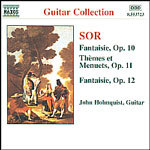
Sor - Complete Guitar Music Vol 8 (Fantaisie, Opp. 10 and 12 / Themes et Menuets, Op. 11 )
 $25.00
Out of Stock
$25.00
Out of Stock6+ weeks add to cart
SOR
Sor - Complete Guitar Music Vol 8 (Fantaisie, Opp. 10 and 12 / Themes et Menuets, Op. 11 )
John Holmquist, guitar
[ Naxos Guitar Collection / CD ]
Release Date: Monday 15 March 2004
This item is currently out of stock. It may take 6 or more weeks to obtain from when you place your order as this is a specialist product.
By the end of the eighteenth century the guitar had evolved into its modern configuration of six single strings in conventional tuning - the "classical" guitar.
This new variant of the ancient instrument was capable of far more than simple strums and chordal accompaniment of singers and violinists, and so it inspired several generations of virtuoso performers and composers, including the Barcelona-born Fernando Sor (1778-1839). Sor received his early musical training at the monastery of Montserrat, where he sang in the famous boys' choir. A prodigious composer, his opera Il Telemaco nell'isola di Calipso was produced in 1797, when he was only nineteen.
In spite of these talents, Sor embarked upon a career in the army, and his military responsibilities do not seem significantly to have curtailed his musical activities or his pursuit of a position in the court. Such dreams were ended by the Napoleonic invasion of Spain in 1808. Many young officers, educated men, were well aware of the backwardness of the Borbon monarchy to which they had sworn their loyalty. The Spanish government had ignored the philosophical and scientific developments of the Enlightenment and continued to sponsor anachronisms such as the Inquisition. A progressive Bonaparte régime would introduce many needed reforms. A performer or composer such as Sor would also have known that Imperial Paris, with its plethora of publishers and its glittering venues, offered far greater opportunities for career advancement than did provincial Madrid. Sor remained loyal to the Borbon dynasty for a while, and contributed a fewpatriotic songs to the cause, but eventually he joined the new Bonaparte régime.The fact that he was a virtuoso guitarist corresponded fortuitously with a Parisian craze for that same instrument. As early as 1810 a fewof Sor's works for guitar, still unpublished in Spain, appeared in Paris in Salvador Castro de Gistau's Journal de musique étrangère. But then the defeat of the French in 1813 and the restoration of the unforgiving Borbons ended Sor's military career and doomed him (and others like him) to an exile from his native land which proved permanent.
Sor's new career was an instant success, taking him from Spain to Paris and London, and on one triumphant tour as far as Moscow. In the late 1820s he returned to Paris, where he remained until his death in 1839, publishing his compositions, teaching, and giving occasional concerts. In all, he published over sixty works for one or two guitars, as well as several dozen songs, a few ballets, and other miscellaneous works. His pieces for guitar, especially the large-scale works and the studies, were composed in the international classical style, and demonstrate a polyphonic approach and an academic concern for form which are often missing in the flamboyant works of his guitarist contemporaries, justifying his reputation as not only a great innovator on the guitar but as a composer of the first rank.
All of the works recorded here were among the several dozen works issued by the Parisian publisher Antoine Meissonnier in the decade after the fall of Napoleon. Sor visited Paris on his way to an extended stay in London; he may have made the publishing arrangements with Meissonnier at that time. Many of the works which Meissonnier published had almost certainly been composed earlier, during Sor's "Spanish" period; a few had already appeared in Castro's Journal orelsewhere as early as 1810. Among these early efforts were large-scale works called "fantasies", in the imprecise parlance of the day, compositions in several movements, usually involving a theme and variations.
Tracks:
Fantaisie, Op. 10
Themes Varies et Douze Menuets, Op. 11
Fantaisie, Op. 12
